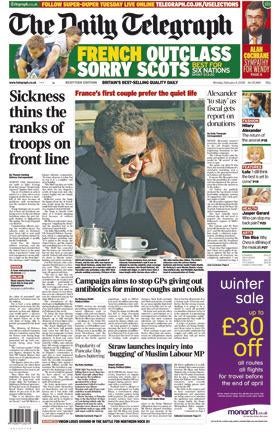
The Advertising Standards Authority has censured the Daily Mail, The Sunday Telegraph and The Sun over ‘misleading’ads for reader offers.
A reader complained to the ASA over The Sun’s offer of a free USB wristband questioning if a charge for post and packaging represented the actual cost.
The offer told readers they could claim ‘free’wristbands by sending the paper a cheque for £2.99 or a ‘padded A4 self-addressed envelope per USB with £1.85 of stamps attached”.
The paper’s publisher, News Group Newspapers, admitted to the ASA an ‘error had occurred with the advertised postage costs…the advertised charges were significantly higher than the actual cost of postage”.
News Group told the ASA the offer was a late inclusion and it had relied on information provided by the company who sourced the USB wristbands.
The ASA upheld the complaint, concluding that the description of the USB wristband as free was misleading because the advertised postage rates.
In its ruling the ASA said it welcomed a commitment from News Group to reviewing postal charges for all future promotions sourced through the ‘fulfilment company’to avoid similar mistakes.
In a similar ruling the ASA censured the Sunday Telegraph – the second time this month that publisher Telegraph Media Group has fallen foul of the advertising watchdog – after readers questioned a front page offer for free audiobooks.
One reader challenged whether the front-page flash was misleading, as it did not make clear the audiobooks came in two parts, with the second included in Monday’s paper.
Another reader contacted the ASA challenging the claim that audiobooks were “free”, because customers who did not live near a WH Smith store – where readers were expected to go with a token from the Daily Telegraph to claim the item – would have to pay £12.99 to receive the audiobooks by post.
TMG told the ASA an ‘oversight’led to the Sunday Telegraph flash having not made clear that the free CD was the first of a two-part story and that the second part would be redeemable at WH Smith.
In addition, TMG told the ASA it believed there were no costs attached to the redemption of the offer at WH Smith, other than buying the newspaper and reasonable travel expenses.
The ASA upheld both complaints and banned the front-page flashes in their current form, ruling that flashes and the claim that the audiobooks were “free” was misleading.
In a third ruling this week, the ASA rapped the Daily Mail after it ran a sales promotion offering ‘every reader the chance to enjoy a luxurious afternoon tea for two at some of the UK’s leading hotels and restaurants – from just £5″.
The offer told readers they needed to collect three tokens which were being printed in the Daily Mail until the end of May and collect a voucher from the newspaper’s website or cut out one from the paper.
The ASA upheld a complaint from a reader who claimed the promotion was misleading, because vouchers were not printed throughout May and he was unable to find tokens in the newspaper.
Associated Newspapers, publisher of the Mail titles, told the ASA it printed vouchers in the Daily Mail throughout May, but the vouchers stopped appearing in The Mail on Sunday in the second week of May. The publisher was unable to confirm for how many days during May the vouchers appeared.
The ASA banned the ad, concluding that the promotion was likely to mislead, as it ‘implied that tokens would be printed in the newspaper every day, which was not the case, and did not make clear that there were alternatives to printed vouchers”.
Email pged@pressgazette.co.uk to point out mistakes, provide story tips or send in a letter for publication on our "Letters Page" blog
